VMware Cloud On Dell EMC: 10 Things You Need To Know
Here are 10 things customers and channel partners need to know about Dell Technologies new hybrid cloud platforms of VMware Cloud Foundation on Dell EMC hardware.
Dell And VMware’s New Hybrid Cloud Platforms
In arguably its biggest cloud launch in years, Dell Technologies recently took the wraps off its new hybrid cloud platform, two similar offerings that includes VMware Cloud Foundation integrated with Dell EMC hardware.
The $91 billion infrastructure giant is striving to become a leader in the hybrid, multi-cloud world with the thunderous launch of Dell Technologies Cloud Platforms and Cloud Data Center-as-a-Service, also known as VMware Cloud on Dell EMC, at Dell Technologies World 2019.
“This is our opportunity to say, ‘Look, this is the best hybrid cloud platform on Earth,” said Matt Baker, senior vice president, Dell EMC Strategy and Planning -- who played a significant role in crafting the new cloud platforms -- in a recent interview with CRN. “We need to tell the world, ‘Look, this is the best way to build your hybrid cloud.’ Customers want a consistent operating environment. … Dell and our channel partners now have a well-oiled hybrid cloud platform that can be used to help our customers achieve their cloud ambitions.”
Here are 10 things you should know about the new VMware Cloud on Dell EMC offerings in terms of the technology inside, targeted use cases and financial models.
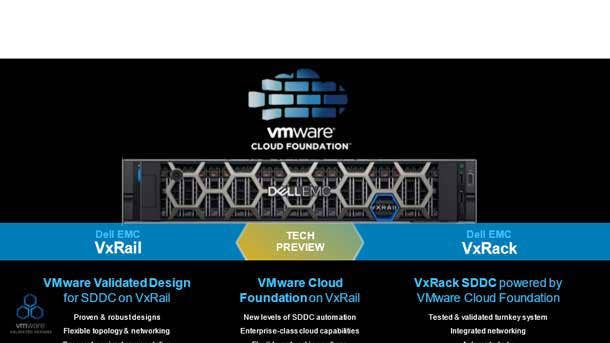
10. The Foundation
The technology inside the Dell Technologies Cloud Platforms and VMware Cloud on Dell EMC are virtually the same as both include VxRail and VMware Cloud Foundation.
VxRail is Dell EMC’s global market-leading hyper-converged infrastructure platform that is co-engineered with VMware. VxRail is powered by Dell EMC PowerEdge servers featuring NVMe cache drives, SmartFabric Services, automated tools and deep integration across the VMware ecosystem. The solution, which includes VMware vSAN, consolidates compute, storage and virtualization with end-to-end automated lifecycle management. The platform includes machine learning capabilities as part of the VxRail HCI System Software.
VMware Cloud Foundation is the company’s software-defined data center platform for private and public cloud. It brings together VMware’s vSphere, vSAN and its highly popular NSX into a natively integrated stack. The offering includes automation and management capabilities for a consistent operational experience across all clouds. Additionally, the VMware SDDC Manager creates and manages workload domains and ensures the software components remain up to date with the latest upgrades.
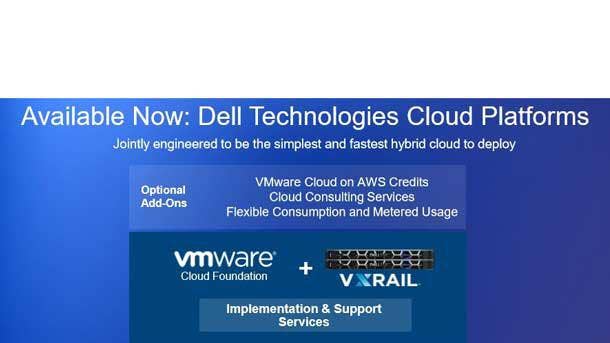
9. VMware Cloud on Dell EMC Use Case No.1: Infrastructure Modernization
Three major use cases have emerged for VMware Cloud on Dell EMC, said Kit Colbert, vice president and CTO, Cloud Platform BU, at VMware in a recent blog post. The most common use case is customers both modernize their infrastructure while at the same time trying to get out of the business of operating that infrastructure. “A big driver of this is the hardware refresh cycle. But customers are sometimes looking at switching earlier for the benefits from streamlined operations or to realize a subscription model for their infrastructure,” Colbert said.
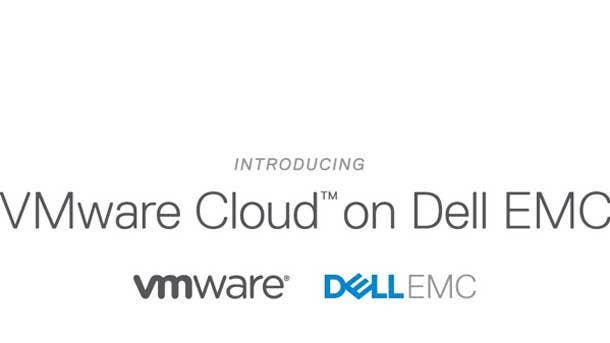
8. VMware Cloud on Dell EMC Use Case No.2: Sensitive Workloads
Although there are many reasons customers keep workloads on-premises, the two most frequent reasons why apps must stay on-premise are due to latency-sensitive or apps that must be kept in certain specific geographic regions for compliance or other reasons, according to Colbert. With the rise of Internet of Things (IoT) and the need to quickly process that raw data, customers are moving applications close to the data. In terms of sensitive geographic compliance, due to the type of data collected and its sensitivity, data must not leave certain locations which necessitates local infrastructure. “VMware Cloud on Dell EMC is a perfect fit for both use cases,” Colbert said.
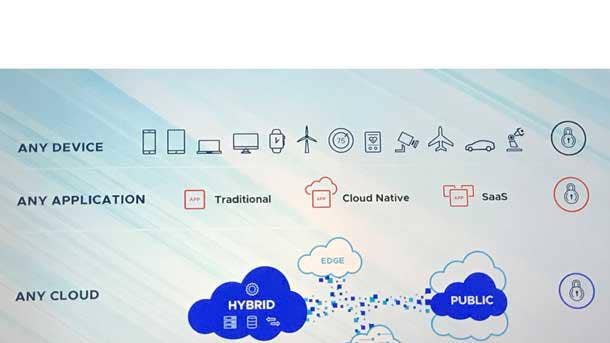
7. VMware Cloud on Dell EMC Use Case No.3: Application Modernization
Customers are innovating in the cloud with new application development methodologies and advances like continuous integration and deployment. Businesses want this same ability on-premises, said Colbert, and VMware Cloud on Dell EMC is the answer because it gives customers a cloud experience within their data center or edge locations, allowing them to run their new applications on-premises just like in the cloud. Additionally, many of these apps have existing components that already run on VMware’s SDDC, meaning the new apps can reside next to the existing ones to allow for peak performance and easy manageability.
It is also key to note in terms of application modernization capabilities that VMware recently announced its purchase of application deployment specialist Bitanmi. The startup provides packaged and validated versions of web applications that can quickly be deployed across heterogenous environments and will help boost VMware’s current work in developing a cloud marketplace. “Bitnami will enable our customers to easily deploy application packages on any cloud— public or hybrid—and in the most optimal format—virtual machine (VM), containers and Kubernetes helm charts," blogged VMware's Milin Desai, general manager for cloud services.
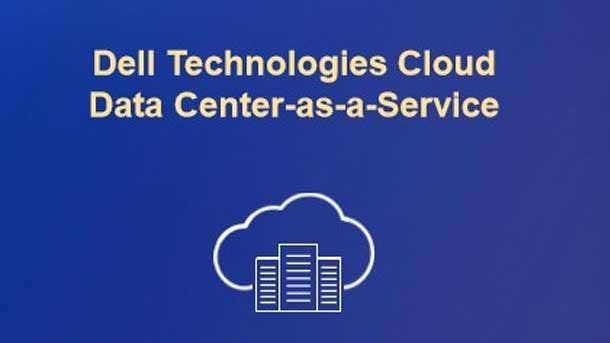
6. VMware Cloud On Dell EMC Is Managed By Dell Technologies
Dell Technologies’ new Cloud Data Center as-a-Service is a consumption-based management service for VMware Cloud in Dell EMC infrastructure. This offer is fully managed by Dell Technologies and can be sold by channel partners. Other than VMware Cloud Foundation and VxRail, the offering includes a VMware Cloud service management layer.
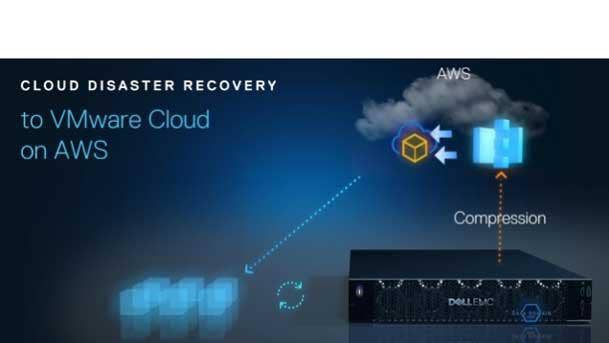
5. Sold As a Monthly Subscription Similar To VMware Cloud on AWS
VMware Cloud on Dell EMC is sold as a monthly subscription with no Capex outlay on one- or three-year agreements. The offering has consumption-based availability similar to how VMware Cloud on AWS is sold, according to Baker. “The VMware Cloud on AWS service can be consumed on demand – you swipe a credit card and pay for it by the period – but the vast majority of cloud consumption after initial experimentation is finished is reserved instances. So you can purchase one-year, three-year reserved instances. The same is true for VMware Cloud on Dell EMC,” Baker said. “So you purchase a reserved instance of capacity and that capacity starts initially with a three-node cluster, with a two-node cluster to come, and you can add to that cluster and you purchase reserved instances of that service.”
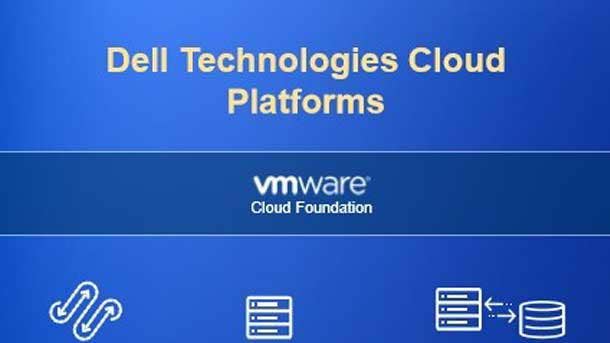
4. Dell Technologies Cloud Platforms Can Mix And Match
The Dell Technologies Cloud Platforms can include the standard technology of VMware Cloud Foundation and VxRail. However, partners and customers can select different Dell EMC hardware to create the solution, meaning VxRail is not the only option unlike the Cloud Data Center as-a-Service offering. Dell has validated designs to build Dell Technologies Cloud Platforms using traditional Dell EMC servers, networking and storage arrays inclusive to Dell EMC Unity and PowerMax. The hybrid cloud platform is built to be flexible in order to meet a variety of workloads and performance needs.
Additionally, customers and partners can add technologies to the solution from other members of the Dell Technologies family of business, which include RSA, SecureWorks, Boomi, VirtuStream and Pivotal. Dell Technologies Cloud Platforms can include technologies such as Pivotal Cloud Foundry and Pivotal Container Service. Organizations, for example, can layer on Platform-as-a-Service (PaaS) to allow developers to build, run and operate applications seamlessly.

3. Dell Financial Services
For specifically the Dell Technologies Cloud Platforms, customers and partners can leverage Dell Financial Services (DFS) that provides a slew of options of how customers can buy all the components inside including Capex, Opex, rent, lease, consume as-a-service or pay per usage. Customers can buy the cloud platforms in one of three flexible consumption solutions: Pay as You Grow, Flex on Demand and Data Center Utility. Flex on Demand allows customers to acquire elastic capacity and only pay for what they use, while Data Center Utility establishes a pay per use environment across the entire IT infrastructure. DFS’ Pay as You Grow includes customized payment solutions to support forecasted growth, flexible deployment schedules, deferrals and pre-provisioned upgrades.
DFS is being leveraged by 2,000 partners worldwide and has a whopping $9.7 billion worth of assets under management. “A partner who uses Dell Financial Services grows twice as fast as partners who don’t,” said Dell’s channel chief Joyce Mullen (pictured) in a recent interview with CRN.
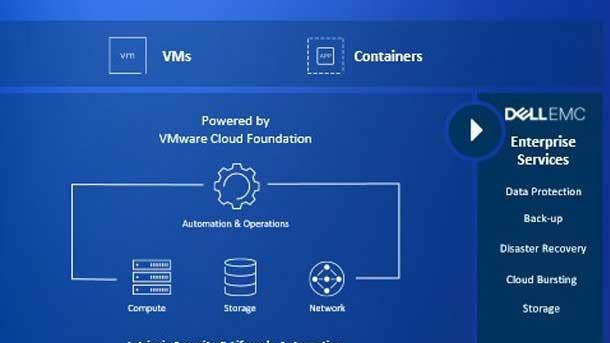
2. Main Differences Between The Two Offerings
The physical installation of Dell Technologies Cloud Platforms and Cloud Data Center as-a-Service are virtually identical. Both leverage VMware Cloud Foundation and VxRail, although Cloud Platforms having the option to mix and match different Dell hardware instead of VxRail. The biggest difference between the two is that Cloud Data Center as-a-Service is managed by Dell with additional VMware management capability. The Cloud Platforms is managed by the customer or partner.
“The difference largely between the two is one is a fully managed service that you don’t touch the equipment, it’s managed for you and you don’t issue tickets or swap hardware drives. In fact, you never touch that platform you simply consume it, that’s the Data Center as-a-Service element. The Dell Technologies Cloud Platforms is where you buy and manage it on your own like what most people are doing today on-premise,” said Baker. “The common layer between the two is that management framework -- that very familiar VMware operational environment. So one is fully managed and one is customer managed. Partners can sell all of this.”

1. Innovation At The Edge
VMware Cloud on Dell EMC brings a fully-managed cloud experience not only to core data centers but edge environments as well. The offering aims to enable the speed and flexibility of public cloud with the security and control of on-premises infrastructure to edge data centers. Dell says this is significant because requirements for integrating security, networking and policy management at the edge are just as stringent as those in core data centers, if not more so. Due to VMware’s hybrid cloud control plane, businesses can easily configure and monitor edge workloads at scale. Features at the edge with VMware Cloud on Dell EMC include self-service provisioning and elastic infrastructure to boost development speed as well as compliance with data sovereignty and regulatory requirements. The company says VMware Cloud on Dell EMC edge capabilities provides partners and customers a distinct advantage not only for industries like banking, healthcare and oil and gas, but in retail and manufacturing.